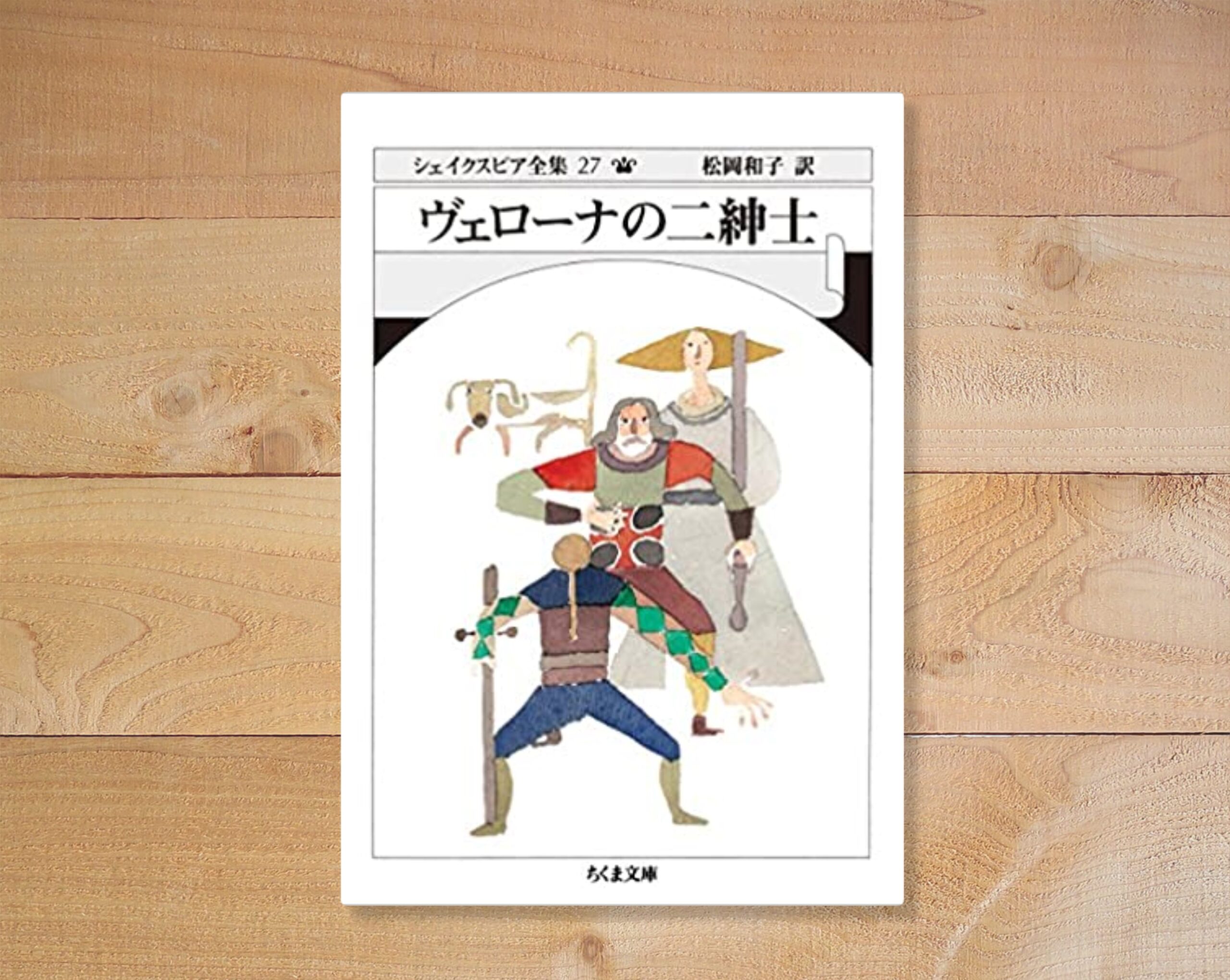Shakespeare's "The Two Gentlemen of Verona" Synopsis and Comments - Shakespeare's early romantic comedy! The Worst Man Ever Here!
I would like to introduce Shakespeare's early work "The Two Gentlemen of Verona". I read the translation by Kazuko Matsuoka of Chikuma Shobo.
Let's take a quick look at the book.
Proutius, a young gentleman from Verona, is reunited with his best friend Valentine in Milan. Valentine had fallen in love with Silvia, the daughter of the Grand Duke of Milan. However, as soon as he meets her, he falls in love at first sight. Meanwhile, Julia, the lover of Proutias, disguised as a peasant, comes to Milan. A romantic comedy from Shakespeare's early period.
Chikuma ShoboProducts Page.
The Two Gentlemen of Verona is a romantic comedy written in Shakespeare's early years.
This work is actually known as a controversial work, and when I actually read it, it was indeed a controversial work.
The commentary at the end of the book talked about this work as follows.
If one had to choose the most disturbing line in Shakespeare's plays that has annoyed critics, directors, and actors, it would have to be Valentine's "I give you all my rights to Sylvia" in Act V, Scene 4 of "The Two Gentlemen of Verona. Since "my right" means the right to have physical relations with Silvia, his fiancée, Valentine is talking about something akin to human trafficking. This is despite the fact that he has just witnessed the scene where the other "you" has been making advances toward his fiancée and attempting to rape her right in front of his eyes. Moreover, this "you" is the one who tipped off Sylvia's father about her secret marriage and is the one who is responsible for the separation of the two.
For the audience (readers), the idea of pardoning such a traitor is unthinkable, and when he talks about giving up his rights, it sounds like Don Quixote or an alien. Even on stage, this line has often been treated as a nuisance.
Chikuma Shobo, Shakespeare, translated by Kazuko Matsuoka, The Two Gentlemen of Verona, p. 177
As I mentioned in the title of the article, this piece develops the worst male behavior of a major character named Proutias.
Although he was engaged to a woman in his hometown of Verona, he easily fell in love with the beautiful Silvia in Milan, where he was on assignment. Silvia is the daughter of the Grand Duke of Milan, who had already secretly promised to marry his best friend Valentine.
Plotius betrays his lover Julia and even his best friend Valentine in an attempt to win Sylvia for himself. When he realizes that she will not be seduced by words, he declares that he will "rape her by force" and even attempts to rape her. If Valentine had not shown up, he would have done exactly what he said he would do.
He is the worst of the worst.
Surprisingly, however, the victim Valentine forgives him after this. And with the words in question, "I give you all my rights over Sylvia..."
This is inexplicable. It is a tremendous leap. Why did Shakespeare draw such a huge leap?
The commentary at the end of the book spoke as follows.
The young Shakespeare wanted to challenge himself to create a play that would astonish the audience (readers). In theory, Shakespeare's first inspiration must have been to create the worst kind of traitor within the limits of what is just about forgivable in a comedy. (omitted).
Shakespeare was probably in his nineties when he wrote this comedy, when he was still a freelance playwright, not a full-time playwright for a theater company. Perhaps "The Two Gentlemen of Verona" was the play in which he put his future on the line, the play in which he devoted the most creative energy throughout his life. There is a betrayal of love, a breach of honor, the appearance of a real one-trick pony, a clown for two with great service, singing, playing, and disguising with the ultimate unlikable character, and an unpredictable finale with a surprise twist.
Chikuma Shobo, Shakespeare, translated by Kazuko Matsuoka, The Two Gentlemen of Verona, p. 180-183
Shakespeare dared to create such outlandish plays. He also wrote scripts full of the spirit of service so that his plays could be enjoyed.
Hmmm...I see.
When I was told that, I began to think that the impression I got from just reading the book and the actual performance might be quite different.
In fact, the translator, Kazuko Matsuoka, recounts her own experience as follows
Reading it for the first time in years, I thought to myself, "Peter Holland, whom I recently met at Cambridge University (now a professor at the University of Notre Dame in Indiana, USA), said that the best Shakespeare play of the season was "The Two Gentlemen of Verona". I didn't quite believe Mr. Holland's words because of the plot, which is full of rushes and what can best be described as osomatics. Not to mention Valentine's "my right to Sylvia," as Haruo Nakano pointed out at the beginning of his commentary on this book, and the abrupt development represented by "What, you suddenly became the leader of bandits? and the sloppy characterization of the characters, such as Sir Eglamor, who is in a state of "shirit" (a state in which he is out of control).
However, I was surprised when I saw it. It was an unmistakably famous stage that I can still vividly see today. (I can see it in my mind's eye even now.)
The production was directed by David Sacker. Love songs were inserted at each scene change, and their lyrics overlapped with the situations in the play. The stage design, white-colored costumes, and props were all in the style of the movie "The Great Gatsby" starring Robert Redford.mainspring, ,cooking over an open fire to prevent contamination from one's everyday fire for performing Shinto riteshave to ...this dogThe contrast between the intelligent and rather petite Prudhian and Valentine, who is so tall and manly that he looks like a fool on the rope ladder, as well as the great performance of the club (double cast, I saw Wooly, a medium-sized dog that looked like a piece of gray yarn), which was a big hit, Sylvia is a beauty and makes me sigh. My daughter and I were lost in the afterglow for a while after we returned to the hotel. (Omitted).
The "Two Gentlemen of Verona" is an accumulation of opportunism, but on the stage of the Swan Theatre, that opportunism was inverted, and the impossible happened one after the other, culminating in the miracle of the grand finale.
Chikuma Shobo, Shakespeare, translated by Kazuko Matsuoka, "The Two Gentlemen of Verona" p169-171
I felt that this is what makes theater so interesting: depending on the stage direction, it can be sublimated into a masterpiece that even the seasoned Mr. Matsuoka, who has fought many battles, said, "My daughter and I were lost in the afterglow for some time after we returned to the hotel.
There is music, beautiful men and women, a fashionable stage, costumes, famous lines, and even a real dog! The spirit of Shakespeare's desire for the audience's enjoyment is evident.
It gives a sense that Shakespeare was trying to entertain his audience as a modern writer, rather than as a small and difficult classical writer of his time. This is a book by Yoshio NakanoShakespeare's Funniest."It was something that was also discussed in the
It is a play that can be enjoyed without being overbearing. I think this aspect is particularly strong in "The Two Gentlemen of Verona". Reading the book alone, the scenario is quite grim, but as Mr. Matsuoka felt, it is a terrific work that can be transformed into a work with tremendous charm depending on the stage direction.
This has been an interesting read.
The above is a summary of Shakespeare's "The Two Gentlemen of Verona" - Shakespeare's early romantic comedy! The Worst Man Here".
Next Article.
Click here to read the previous article.
Related Articles







































